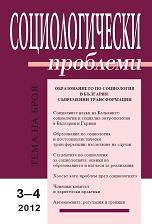Формиране на човешкия капитал през комунистическия период в България
Human Capital Formation during the Communism in Bulgaria
Author(s): Ralitsa Simeonova-GanevaSubject(s): Social Sciences
Published by: Институт по философия и социология при БАН
Keywords: human capital; communism; determinants of human capital formation;
Summary/Abstract: The question raised in the present paper is: What was the human capital under communism and what were the key political and economic determinants of its formation in that period? Firstly, a measurement of the human capital is conducted on the basis of quantitative educational indicators. The empirical analysis suggests twelve new time series for human capital that are consistent with the modern approaches to human capital measurement. Secondly, key political and economic determinants are identified on the basis of a survey of relevant documents in the State Archives, and using social science research on that period of history. We observe a considerable improvement in human capital stocks over the period. Significant changes occurred at the end of the 1950s and during the 1960s. Later, at the end of the 1970s and during the 1980s, we observe a decline in participation in the educational system. In the beginning of the transition to market economy, about 60% of the population in Bulgaria had attained basic education or lower. In spite of the fact that during the whole period the government was trying to provide factorable conditions for human capital formation, in the long run its policies failed to improve the educational structure of the population. We assume that a possible explanation of the phenomenon is the lack of economic incentives for individuals to pursue higher education.
Journal: Социологически проблеми
- Issue Year: 44/2012
- Issue No: 3-4
- Page Range: 303-326
- Page Count: 24
- Language: Bulgarian
- Content File-PDF

